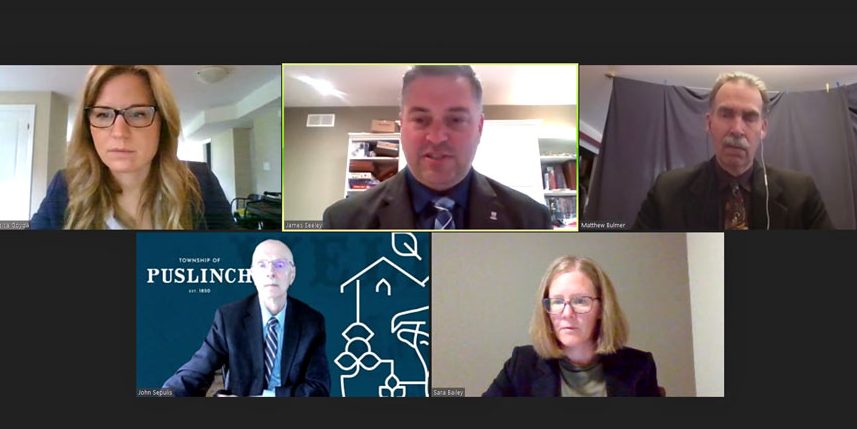PUSLINCH – Puslinch council is requesting that CBM cease aggregate extraction on pond C at the Roszell Pit until the company resolves ongoing issues at the site.
The pit is located on Roszell Road near Concession 4 in the township.
At its May 4 meeting council was unanimously in favour of the action, which was prompted by a report from Golder Associates Ltd., the firm hired by CBM to review the work of its consultant Groundwater Science. CBM typically hires an outside firm to review the work of the consultant and the township’s consultant when there is a difference of opinion.
Golder suggested in its review that aggregate activity was having a minimal effect on the surrounding area. But it did acknowledge water levels in the wetland were low, in part due to the berm and silt barrier at the pit. Last spring was also very dry, which compounded the problem.
Golder recommended CBM apply for a temporary permit to take water “to allow for mitigation pumping from the pit lakes to the wetland,” the Golder report reads.
It also recommended working with the Grand River Conservation Authority to find a more permanent solution.
Councillor John Sepulis seized upon this.
“My concern is the loss of water in the wetlands,” he said. “They need to develop a plan to restore water to the wetlands to historical levels.”
Councillor Matthew Bulmer said the berm, designed to buffer the noise of operations, was incorrectly positioned and as below water excavation was being done at the ponds, instead of being contained, water was actually being drawn from the wetland area to the pond.
Bulmer also noted both the berm and the silt barrier – a measure to help contain water within the wetland area – have been identified as problems in the past and remain unresolved.
Councillor Sara Bailey said according to her notes, the township told CBM to cease extraction in December 2020 and wrote a letter to the Ministry of Northern Development, Mines, Natural Resources and Forestry in May 2021 expressing its concerns.
The township’s hydrogeologist Harden Environmental Ltd. reviewed the company’s reports.
“We recognize that 2021 was a very unique year in that there was the least amount of seasonal groundwater recharge between November 2020 and April 2021 that we have ever recorded in this part of Ontario,” Harden Environmental wrote in its review of CBM’s Golder report.
“However, when groundwater monitor MW7D (downgradient of pit ponds) approaches a historic high in the same year, we recognize that a) the pit ponds are affecting water levels; and b) the effect around the pit ponds is not equal.”
The review adds, “It remains our opinion that the hydraulic barrier (silt barrier) has not effectively mitigated the lowering of water levels caused by the extractive activities in the pit.
“It is our opinion that the extractive activities in the pit have both exacerbated the drought conditions and lowered water levels in private ponds, possibly permanently.”
Bulmer suggested the township send the letter to CBM and see what happens.
The matter will come back to council on May 25 and council is hopeful the company will take action by then.
“After this, perhaps we pass a motion to ask the ministry to stop them from extracting,” Bulmer said.
“I like that approach,” said Mayor James Seeley.
In an email to the Advertiser, David Hanratty, director of land, resources and environment for CBM’s parent company Votorantium Cimentos, said CBM Aggregates has operated the site within the established and agreed-upon water level thresholds.
He said both the township’s hydrogeologist and the consultant hired by CBM acknowledged the primary influence on the wetland has been the lower precipitation levels over the last few years.
“Last year, we stopped active extraction in Pond C and actively monitored water levels in the area to see if there would be a positive response/raising of water levels,” Hanratty stated.
“During the period of time that the extraction activities were not being carried out, water levels did not ‘rebound’. Similarly, when we resumed extraction there was no correlation to water levels lowering as a result.”
He added, “In contrast, the recent increase in precipitation over the winter and spring of 2022 has directly resulted in increased water levels in the wetland, further supporting the consultants’ conclusion that the main factor in lower water levels in the wetland has been the lower precipitation levels over the last few years.
“It should be noted that the township’s consultant has not reviewed this data yet as it will be in the 2022 monitoring report.”
Hanratty said the company will continue to work with the township, GRCA and the Ministry of Natural Resources on mitigation methods “to help ensure water is present in the wetland at times of the year when it should be, which the township’s ecological consultant also agreed was the right approach.”




